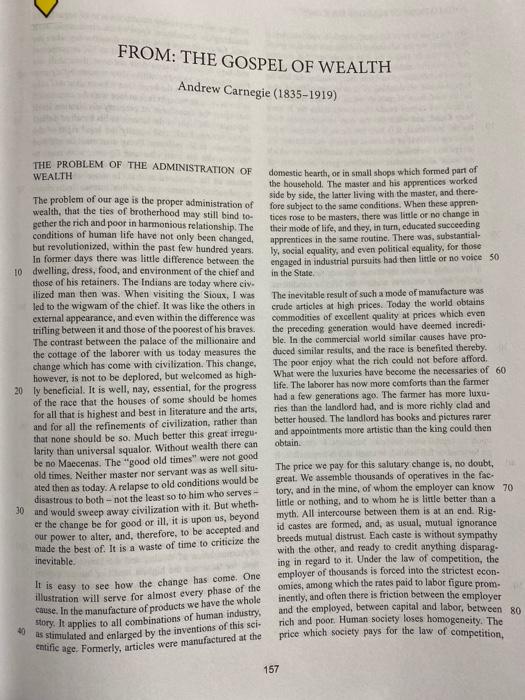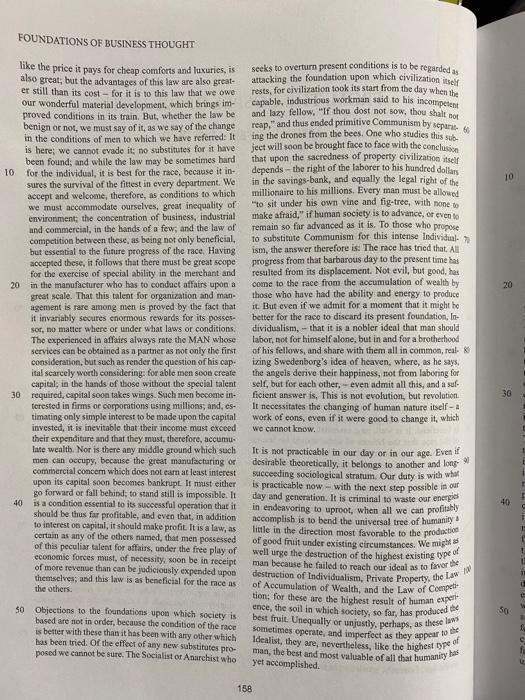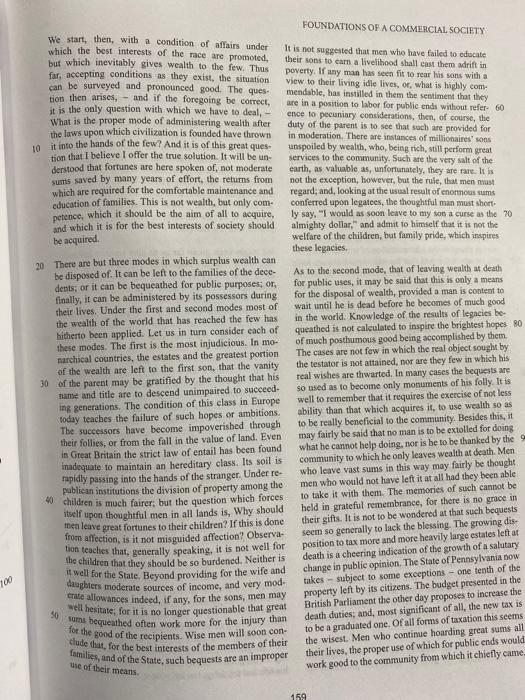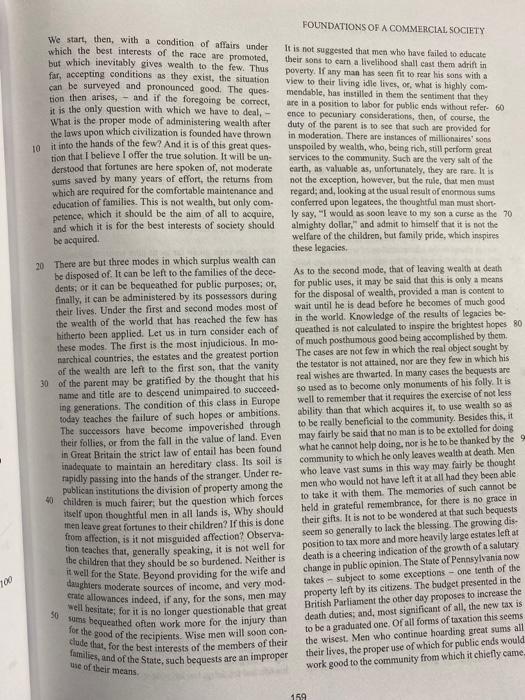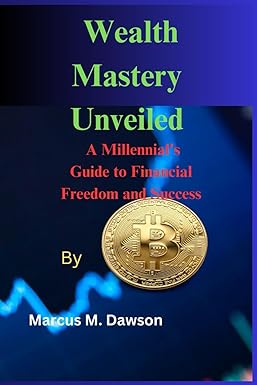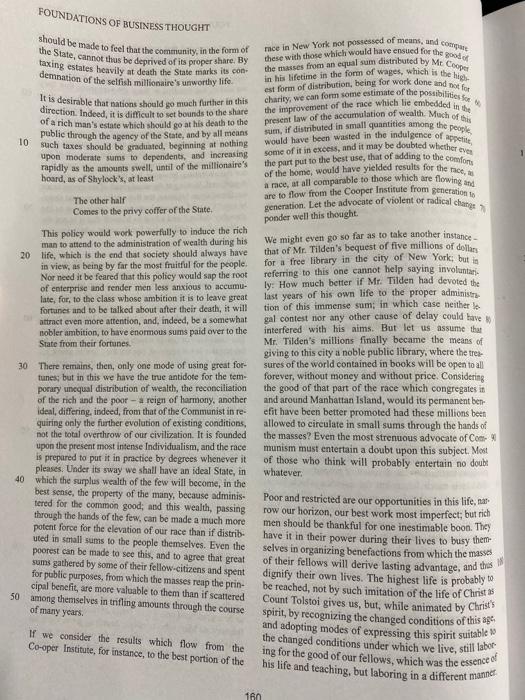
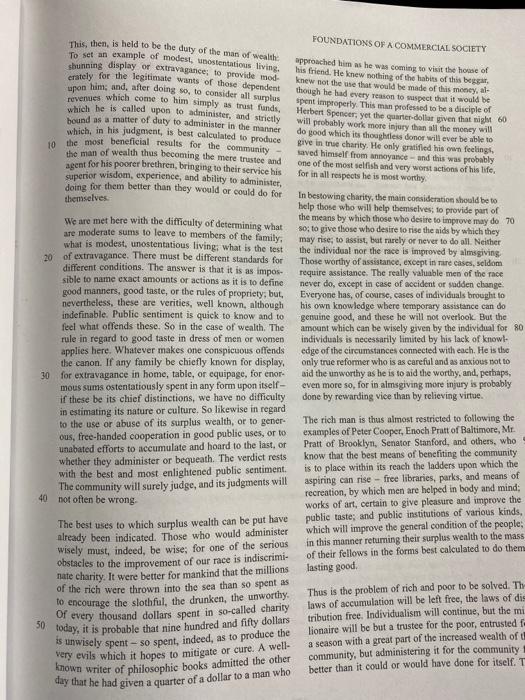
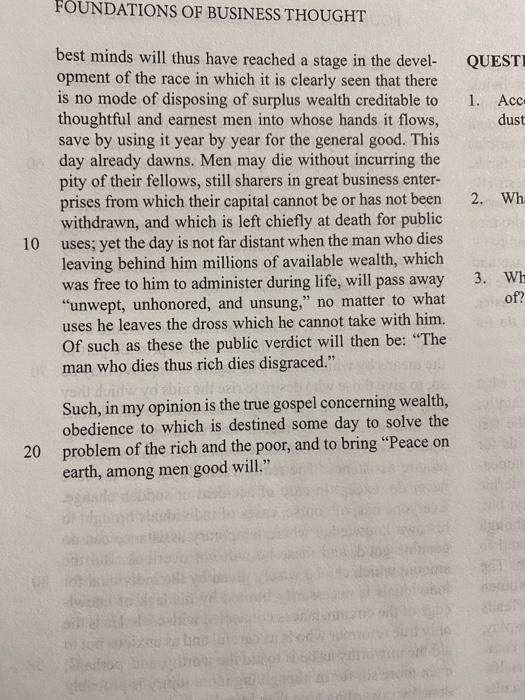
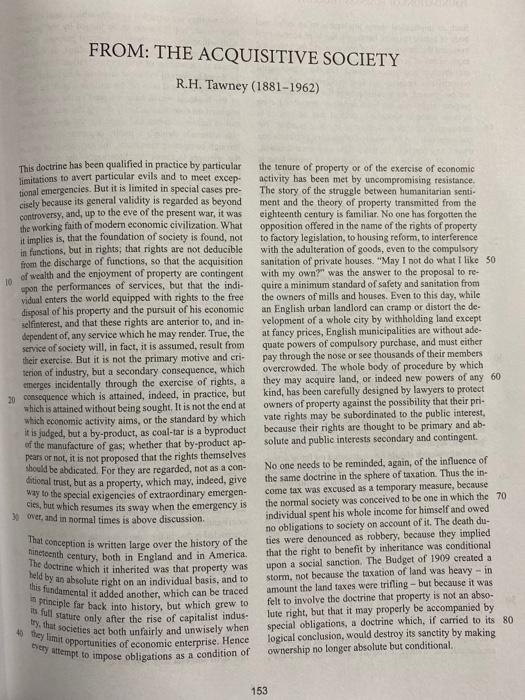
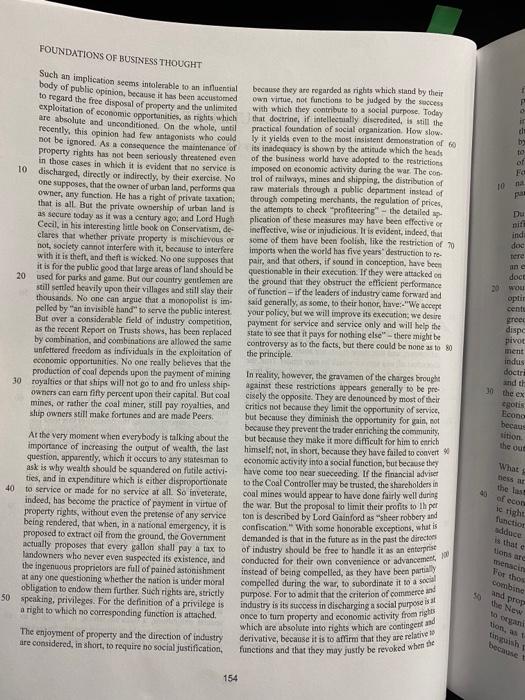
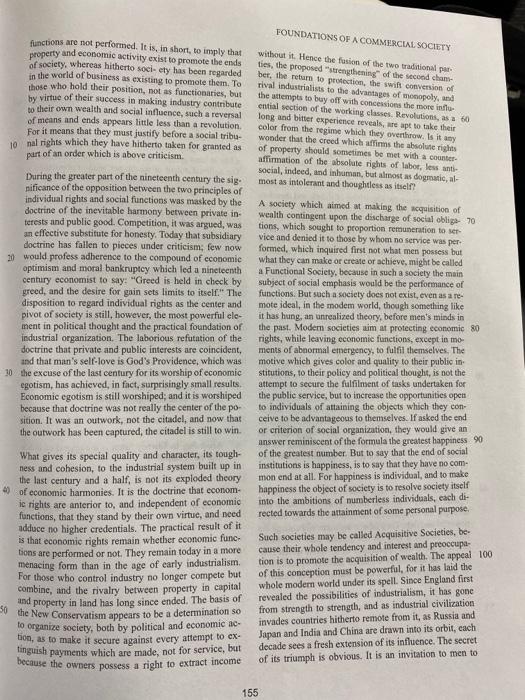
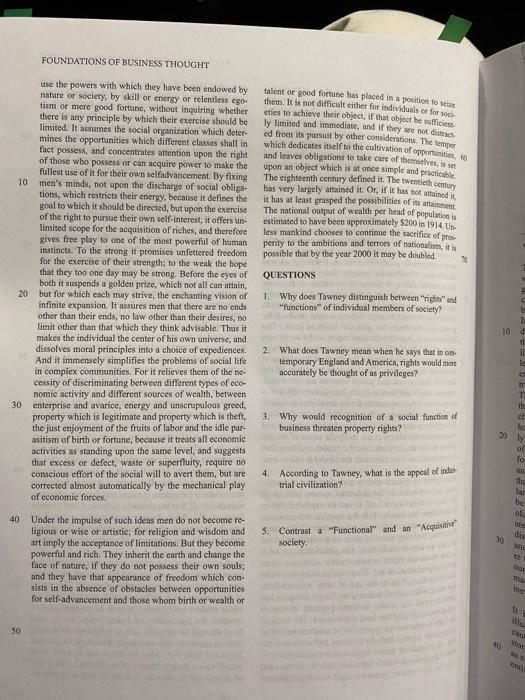
Carnegie & Tawney What are Carnegie's perspectives about the distribution of 'surplus wealth, and to what extent does this agree/disagree with Tawney's perspective about taxing the rich? FROM: THE GOSPEL OF WEALTH Andrew Carnegie (1835-1919) THE PROBLEM OF THE ADMINISTRATION OF WEALTH domestic hearth, or in small shops which formed part of the household. The master and his apprentices worked side by side, the latter living with the master, and there fore subject to the same conditions. When these appren tices rose to be masters, there was little or no change in their mode of life, and they, in turn, educated succeeding apprentices in the same routine. There was, substantial ly, social equality, and even political equality, for those engaged in industrial pursuits had then little or no voice 50 in the State The problem of our age is the proper administration of wealth, that the ties of brotherhood may still bind to- gether the rich and poor in harmonious relationship. The conditions of human life have not only been changed, but revolutionized, within the past few hundred years. In former days there was little difference between the 10 dwelling, dress, food, and environment of the chief and those of his retainers. The Indians are today where civ. ilized man then was. When visiting the Sioux, I was led to the wigwam of the chief. It was like the others in external appearance, and even within the difference was trifling between it and those of the poorest of his braves. The contrast between the palace of the millionaire and the cottage of the laborer with us today measures the change which has come with civilization. This change, however, is not to be deplored, but welcomed as high- 20 ly beneficial. It is well, nay, essential, for the progress of the race that the houses of some should be homes for all that is highest and best in literature and the arts, and for all the refinements of civilization, rather than that none should be so. Much better this great irregu. larity than universal squalor. Without wealth there can be no Maecenas. The good old times" were not good old times. Neither master nor servant was as well situ- ated then as today. A relapse to old conditions would be disastrous to both - not the least so to him who serves - 30 and would sweep away civilization with it. But wheth- er the change be for good or ill, it is upon us, beyond our power to alter, and, therefore, to be accepted and made the best of. It is a waste of time to criticize the inevitable The inevitable result of such a mode of manufacture was crude articles at high prices. Today the world obtains commodities of excellent quality at prices which even the preceding generation would have deemed incredi- ble. In the commercial world similar causes have pro- duced similar results, and the race is benefited thereby The poor enjoy what the rich could not before afford. What were the luxuries have become the necessaries of 60 life. The laborer has now more comforts than the farmer had a few generations ago. The farmer has more luxu- ries than the landlord had, and is more richly cind and better housed. The landlord has books and pictures rarer and appointments more artistic than the king could then obtain The price we pay for this salutary change is, no doubt, great. We assemble thousands of operatives in the fac- tory, and in the mine, of whom the employer can know 70 little or nothing, and to whom he is little better than a myth. All intercourse between them is an end. Rig. id castes are formed, and, as usual, mutual ignorance breeds mutual distrust. Each caste is without sympathy with the other, and ready to credit anything disparag- ing in regard to it. Under the law of competition, the employer of thousands is forced into the strictest econ- omies, among which the rates paid to labor figure prom. inently, and often there is friction between the employer and the employed, between capital and labor, between 80 rich and poor. Human society loses homogeneity. The price which society pays for the law of competition, It is easy to see how the change has come. One illustration will serve for almost every phase of the cause. In the manufacture of products we have the whole Story. It applies to all combinations of human industry, as stimulated and enlarged by the inventions of this sci- entific age. Formerly, articles were manufactured at the 157 code that for the best interests of the members of their files, and of the State, such bequests are an improper FOUNDATIONS OF A COMMERCIAL SOCIETY We start, then, with a condition of affairs under which the best interests of the race are promoted, It is not suggested that men who have failed to educate but which inevitably gives wealth to the few. Thus their sons to earn a livelihood shall cast them adrift in far, accepting conditions as they exist, the situation poverty. If any man has seen fit to rear his sons with a can be surveyed and pronounced good. The ques- view to their living idle lives, or, what is highly com tion then arises, - and if the foregoing be correct, mendable, has instilled in them the sentiment that they it is the only question with which we have to deal, are in a position to labor for public ends without refer 60 What is the proper mode of administering wealth after ence to pecuniary considerations, then, of course, the the laws upon which civilization is founded have thrown duty of the parent is to see that such are provided for in moderation. There are instances of millionaires soos 10 it into the hands of the few? And it is of this great ques. tion that I believe I offer the true solution. It will be un unspoiled by wealth, who, being rich, still perform great services to the community. Such are the very salt of the derstood that fortunes are here spoken of, not moderate earth, as valuable as, unfortunately, they are rare. It is sums saved by many years of effort, the returns from not the exception, however, but the rule, that men must which are required for the comfortable maintenance and regard, and looking at the usual result of enormous sums education of families. This is not wealth, but only com. conferred upon legates, the thoughtful man must short petence, which it should be the aim of all to acquire, ly say, "I would as soon leave to my son a curse as the 70 and which it is for the best interests of society should almighty dollar, and admit to himself that it is not the be acquired welfare of the children, but family pride, which inspires these legacies 20 There are but three modes in which surplus wealth can be disposed of. It can be left to the families of the dece- As to the second mode, that of leaving wealth at death dents; or it can be bequeathed for publie purposes; or, for public uses, it may be said that this is only a means finally, it can be administered by its possessors during for the disposal of wealth, provided a man is content to their lives. Under the first and second modes most of wait until he is dead before he becomes of much good the wealth of the world that has reached the few has in the world. Knowledge of the results of legacies be hitherto been applied. Let us in turn consider each of queathed is not calculated to inspire the brightest hopes 80 these modes. The first is the most injudicious. In mo- of much posthumous good being accomplished by them. narchical countries, the estates and the greatest portion The cases are not few in which the real object sought by of the wealth are left to the first son, that the vanity the testator is not attained, nor are they few in which his 30 of the parent may be gratified by the thought that his real wishes are thwarted. In many cases the bequests are name and title are to descend unimpaired to succeed- so used as to become only monuments of his folly. It is ing generations. The condition of this class in Europe well to remember that it requires the exercise of not less today teaches the failure of such hopes or ambitions. ability than that which acquires it, to use wealth so as The successors have become impoverished through to be really beneficial to the community. Besides this, it their follies, or from the fall in the value of land. Even may fairly be said that no man is to be extolled for doing in Great Britain the strict law of entail has been found what he cannot help doing, nor is be to be thanked by the inadequate to maintain an hereditary class. Its soil is community to which be only leaves wealth at death. Men rapidly passing into the hands of the stranger. Under re- who leave vast sums in this way may fairly be thought publican institutions the division of property among the men who would not have left it at all had they been able 40 children is much fairer, but the question which forces to take it with them. The memories of such cannot be itself upon thoughtful men in all lands is, Why should held in grateful remembrance, for there is no grace in men leave great fortunes to their children? If this is done their gifts. It is not to be wondered at that such bequests from affection, is it not misguided affection? Observa- seem so generally to lack the blessing. The growing dis. tion teaches that, generally speaking, it is not well for position to tax more and more heavily large estates left at the children that they should be so burdened. Neither is death is a cheering indication of the growth of a salutary it well for the State. Beyond providing for the wife and change in public opinion. The State of Pennsylvania now daighters moderate sources of income, and very mod- takes - subject to some exceptions - one tenth of the crate allowances indeed, if any, for the sons, men may property left by its citizens. The budget presented in the well hesitate; for it is no longer questionable that great British Parliament the other day proposes to increase the soms bequeathed often work more for the injury than death duties, and, most significant of all, the new tax is for the good of the recipients. Wise men will soon con- to be a graduated one. Of all forms of taxation this seems the wisest. Men who continue hoarding great sums all their lives, the proper use of which for public ends would work good to the community from which it chiefly came 100 50 w of their means 159 code that for the best interests of the members of their files, and of the State, such bequests are an improper FOUNDATIONS OF A COMMERCIAL SOCIETY We start, then, with a condition of affairs under which the best interests of the race are promoted, It is not suggested that men who have failed to educate but which inevitably gives wealth to the few. Thus their sons to earn a livelihood shall cast them adrift in far, accepting conditions as they exist, the situation poverty. If any man has seen fit to rear his sons with a can be surveyed and pronounced good. The ques- view to their living idle lives, or, what is highly com tion then arises, - and if the foregoing be correct, mendable, has instilled in them the sentiment that they it is the only question with which we have to deal, are in a position to labor for public ends without refer 60 What is the proper mode of administering wealth after ence to pecuniary considerations, then, of course, the the laws upon which civilization is founded have thrown duty of the parent is to see that such are provided for in moderation. There are instances of millionaires soos 10 it into the hands of the few? And it is of this great ques. tion that I believe I offer the true solution. It will be un unspoiled by wealth, who, being rich, still perform great services to the community. Such are the very salt of the derstood that fortunes are here spoken of, not moderate earth, as valuable as, unfortunately, they are rare. It is sums saved by many years of effort, the returns from not the exception, however, but the rule, that men must which are required for the comfortable maintenance and regard, and looking at the usual result of enormous sums education of families. This is not wealth, but only com. conferred upon legates, the thoughtful man must short petence, which it should be the aim of all to acquire, ly say, "I would as soon leave to my son a curse as the 70 and which it is for the best interests of society should almighty dollar, and admit to himself that it is not the be acquired welfare of the children, but family pride, which inspires these legacies 20 There are but three modes in which surplus wealth can be disposed of. It can be left to the families of the dece- As to the second mode, that of leaving wealth at death dents; or it can be bequeathed for publie purposes; or, for public uses, it may be said that this is only a means finally, it can be administered by its possessors during for the disposal of wealth, provided a man is content to their lives. Under the first and second modes most of wait until he is dead before he becomes of much good the wealth of the world that has reached the few has in the world. Knowledge of the results of legacies be hitherto been applied. Let us in turn consider each of queathed is not calculated to inspire the brightest hopes 80 these modes. The first is the most injudicious. In mo- of much posthumous good being accomplished by them. narchical countries, the estates and the greatest portion The cases are not few in which the real object sought by of the wealth are left to the first son, that the vanity the testator is not attained, nor are they few in which his 30 of the parent may be gratified by the thought that his real wishes are thwarted. In many cases the bequests are name and title are to descend unimpaired to succeed- so used as to become only monuments of his folly. It is ing generations. The condition of this class in Europe well to remember that it requires the exercise of not less today teaches the failure of such hopes or ambitions. ability than that which acquires it, to use wealth so as The successors have become impoverished through to be really beneficial to the community. Besides this, it their follies, or from the fall in the value of land. Even may fairly be said that no man is to be extolled for doing in Great Britain the strict law of entail has been found what he cannot help doing, nor is be to be thanked by the inadequate to maintain an hereditary class. Its soil is community to which be only leaves wealth at death. Men rapidly passing into the hands of the stranger. Under re- who leave vast sums in this way may fairly be thought publican institutions the division of property among the men who would not have left it at all had they been able 40 children is much fairer, but the question which forces to take it with them. The memories of such cannot be itself upon thoughtful men in all lands is, Why should held in grateful remembrance, for there is no grace in men leave great fortunes to their children? If this is done their gifts. It is not to be wondered at that such bequests from affection, is it not misguided affection? Observa- seem so generally to lack the blessing. The growing dis. tion teaches that, generally speaking, it is not well for position to tax more and more heavily large estates left at the children that they should be so burdened. Neither is death is a cheering indication of the growth of a salutary it well for the State. Beyond providing for the wife and change in public opinion. The State of Pennsylvania now daighters moderate sources of income, and very mod- takes - subject to some exceptions - one tenth of the crate allowances indeed, if any, for the sons, men may property left by its citizens. The budget presented in the well hesitate; for it is no longer questionable that great British Parliament the other day proposes to increase the soms bequeathed often work more for the injury than death duties, and, most significant of all, the new tax is for the good of the recipients. Wise men will soon con- to be a graduated one. Of all forms of taxation this seems the wisest. Men who continue hoarding great sums all their lives, the proper use of which for public ends would work good to the community from which it chiefly came 100 50 w of their means 159 direction. Indeed, it is difficult to set bounds to the share FOUNDATIONS OF BUSINESS THOUGHT should be made to feel that the community, in the form of race in New York not possessed of means, and com the State, cannot thus be deprived of its proper share. By these with those which would have ensued for the good taxing estates heavily at death the State marks its con the masses from an equal sum distributed by Mc Cooper demnation of the selfish millionaire's worthy life in his lifetime in the form of wages, which is the big est form of distribution, being for work done and it for charity, we can for some estimate of the possible for the improvement of the race which lie embedded in the present law of the accumulation of wealth. Mach of his sum, if distributed in small quantities among the people would have been wasted in the indulgence of appetit, some of it in excess, and it may be doubted whether eyes the purt put to the best use, that of adding to the como of the home, would have yielded results for the race, a race, af all comparable to those which are flowing and are to flow from the Cooper Institute from generation to generation. Let the advocate of violent or radical chang and adopting modes of expressing this spirit suitable to the changed conditions under which we live, still labor ing for the good of our fellows, which was the essence of his life and teaching, but laboring in a different manner It is desirable that nations should go much further in this of a rich man's estate which should go at his death to the public through the agency of the State, and by all means 10 such taxes should be graduated, beginning at nothing upon moderate sums to dependents, and increasing rapidly as the amounts swell, until of the millionaire's board, as of Shylock's, at least The other half Comes to the privy coffer of the State. ponder well this thought. the rich This policy would work powerfully to indu man to attend to the administration of wealth during his We might even go so far as to take another instance 20 life, which is the end that society should always have that of Mr. Tilden's bequest of five millions of dollar in view, as being by far the most fruitful for the people, for a free library in the city of New York: but in Nor need it be feared that this policy would sap the root referring to this one cannot help saying involuntari of enterprise and render men less anxious to accumu- ly: How much better if Mr. Tilden had devoted the late, for, to the class whose ambition it is to leave great last years of his own life to the proper administra fortunes and to be talked about after their death, it will tion of this immense sum; in which case neither attract even more attention, and, indeed, be a somewhat gal contest nor any other cause of delay could have nobler ambition, to have enormous sums paid over to the interfered with his aims. But let us assume that State from their fortunes. Mr. Tilden's millions finally became the means of giving to this city a noble public library, where the tree 30 There remains, then, only one mode of using great for- sures of the world contained in books will be open to all tunes, but in this we have the true antidote for the tem- forever, without money and without price. Considering porary unequal distribution of wealth, the reconciliation the good of that part of the race which congregates in of the rich and the poor - a reign of harmony, another and around Manhattan Island, would its permanent ben- ideal, differing, indeed, from that of the Communist in re- efit have been better promoted had these millions been quiring only the further evolution of existing conditions, allowed to circulate in small sums through the hands of not the total overthrow of our civilization. It is founded the masses? Even the most strenuous advocate of Con upon the present most intense Individualism, and the race munism must entertain a doubt upon this subject. Most is prepared to put it in practice by degrees whenever it of those who think will probably entertain no doubt pleases. Under its sway we shall have an ideal State, in whatever 40 which the surplus wealth of the few will become, in the best sense, the property of the many, because adminis- tered for the common good, and this wealth, passing Poor and restricted are our opportunities in this life, na through the hands of the few, can be made a much more row our horizon, our best work most imperfect; but rich potent force for the elevation of our race than if distrib- men should be thankful for one inestimable boon. They uted in small sums to the people themselves. Even the have it in their power during their lives to busy them poorest can be made to see this, and to agree that great selves in organizing benefactions from which the masses sums gathered by some of their fellow-citizens and spent of their fellows will derive lasting advantage, and this for public purposes, from which the masses reap the prin- dignify their own lives. The highest life is probably to cipal benefit, are more valuable to them than if scattered be reached, not by such imitation of the life of Christ 50 among themselves in trifting amounts through the course Count Tolstoi gives us, but, while animated by Christ's of many years spirit, by recognizing the changed conditions of this age, If we consider the results which flow from the Co-oper Institute, for instance, to the best portion of the 10 This, then, is held to be the duty of the man of wealth FOUNDATIONS OF A COMMERCIAL SOCIETY To set an example of modest, unostentatious living shumning display of extravagance; to provide mod- approached him as he was coming to visit the home of erately for the legitimate wants of those dependent his friend. He knew nothing of the habits of this bar upon him, and, after doing so, to consider all surplus knew not the me that would be made of this money, al- though he had every reason to suspect that it would be which he is called upon to administer, and strictly spent improperly. This man professed to be a disciple of Herbert Spencer, yet the quarter-dollar given that night 60 bound as a matter of daty to administer in the manner will probably work more injury than all the money will which, in his judgment, is best calculated to produce do good which is thoughtless donor will ever be able to 10 the most beneficial Tesults for the community give in true charity. He only gratified his own feelings, the man of wealth thus becoming the mere trustee and saved himself from annoyance - and this was probably agent for his poorer brethren, bringing to their service his one of the most selfish and very worst actions of his life superior wisdom, experience, and ability to administer, for in all respects he is most worthy doing for them better than they would or could do for themselves In bestowing charity, the main consideration should be to help those who will help themselves to provide part of We are met here with the difficulty of determining what the means by which those who desire to improve may do 70 are moderate sums to leave to members of the family, so; to give those who desire to rise the aids by whil they what is modest, unostentatious living what is the test may rise to assist, but rarely or never to do all. Neither the individual nor the race is improved by almsgiving 20 of extravagance. There must be different standards for different conditions. The answer is that it is as impos- Those worthy of assistance, except in rare cases, seldom require assistance. The really valuable men of the race sible to name exact amounts or actions as it is to define never do, except in case of accident or sadden change. good manners, good taste, or the rules of propriety, but Everyone has, of course, cases of individuals brought to nevertheless, these are verities, well known, although his own knowledge where temporary assistance can do indefinable. Public sentiment is quick to know and to genuine good, and these he will not overlook. But the feel what offends these. So in the case of wealth. The amount which can be wisely given by the individual for 80 rule in regard to good taste in dress of men or women individuals is necessarily limited by his lack of knowl- applies here. Whatever makes one conspicuous offends edge of the circumstances connected with each. He is the the canon. If any family be chiefly known for display, only true reformer who is as careful and as anxious not to 30 for extravagance in home, table, or equipage, for enor- aid the unworthy as he is to aid the worthy, and, perhaps, mous sums ostentatiously spent in any form upon itself- even more so, for in almsgiving more injury is probably if these be its chief distinctions, we have no difficulty done by rewarding vice than by relieving virtue. in estimating its nature or culture. So likewise in regard to the use or abuse of its surplus wealth, or to gener The rich man is thus almost restricted to following the ous, free-handed cooperation in good public uses, or to examples of Peter Cooper, Enoch Pratt of Baltimore, Mr. unabated efforts to accumulate and hoard to the last, or Pratt of Brooklyn, Senator Stanford, and others, who know that the best means of benefiting the community whether they administer or bequeath. The verdict rests is to place within its reach the ladders upon which the with the best and most enlightened public sentiment aspiring can rise - free libraries, parks, and means of The community will surely judge, and its judgments will 40 not often be wrong- recreation, by which men are helped in body and mind; works of art, certain to give pleasure and improve the public taste and public institutions of various kinds, The best uses to which surplus wealth can be put have which will improve the general condition of the people; already been indicated. Those who would administer in this manner retuming their surplus wealth to the mass Wisely must, indeed, be wise; for one of the serious of their fellows in the forms best calculated to do them obstacles to the improvement of our race is indiscrimi- lasting good nate charity. It were better for mankind that the millions of the rich were thrown into the sea than so spent as Thus is the problem of rich and poor to be solved. The to encourage the slothful, the drunken, the unworthy laws of accumulation will be left free, the laws of die Of every thousand dollars spent in so-called charity tribution free. Individualism will continue, but the mi lionaire will be but a trustee for the poor, entrusted in is unwisely spent - so spent, indeed, as to produce the a season with a great part of the increased wealth of community, but administering it for the community known writer of philosophic books admitted the other better than it could or would have done for itself. T 50 today, it is probable that nine hundred and fifty dollars Very evils which it hopes to mitigate or cure. A well- day that he had given a quarter of a dollar to a man who held by an absolute right on an individual basis, and to This fundamental it added another, which can be traced is principle far back into history, but which grew to To full stature only after the rise of capitalist indus- 40 they limit opportunities of economic enterprise. Hence try, the societies act both unfairly and unwisely when try tempt to impose obligations as a condition of FROM: THE ACQUISITIVE SOCIETY R.H. Tawney (1881-1962) This doctrine has been qualified in practice by particular the tenure of property or of the exercise of economic limitations to avert particular evils and to meet excep activity has been met by uncompromising resistance. tional emergencies. But it is limited in special cases pre- The story of the struggle between humanitarian senti cisely because its general validity is regarded as beyond ment and the theory of property transmitted from the controversy, and, up to the eve of the present war, it was eighteenth century is familiar. No one has forgotten the the working faith of modem economic civilization. What opposition offered in the name of the rights of property it implies is, that the foundation of society is found, not to factory legislation, to housing reform, to interference in functions, but in rights, that rights are not deducible with the adulteration of goods, even to the compulsory from the discharge of functions, so that the acquisition sanitation of private houses. "May I not do what I like 50 of wealth and the enjoyment of property are contingent 10 with my own?" was the answer to the proposal to re- upon the performances of services, but that the indi- quire a minimum standard of safety and sanitation from vidual enters the world equipped with rights to the free the owners of mills and houses. Even to this day, while disposal of his property and the pursuit of his economic an English urban landlord can cramp or distort the de. selfinterest, and that these rights are anterior to, and in- velopment of a whole city by withholding land except dependent of any service which he may render. True, the at fancy prices, English municipalities are without ade- service of society will, in fact, it is assumed, result from quate powers of compulsory purchase, and must either their exercise. But it is not the primary motive and cri- pay through the nose or see thousands of their members terion of industry, but a secondary consequence, which overcrowded. The whole body of procedure by which emerges incidentally through the exercise of rights, a they may acquire land, or indeed new powers of any 60 20 consequence which is attained, indeed, in practice, but kind, has been carefully designed by lawyers to protect which is attained without being sought, It is not the end at owners of property against the possibility that their pri- which economic activity aims, or the standard by which vate rights may be subordinated to the public interest, it is judged, but a by-product, as coal-tar is a byproduct because their rights are thought to be primary and ab- of the manufacture of gas; whether that by-product ap- solute and public interests secondary and contingent. pears or not, it is not proposed that the rights themselves should be abdicated. For they are regarded, not as a con- No one needs to be reminded, again, of the influence of ditional trust, but as a property, which may, indeed, give the same doctrine in the sphere of taxation. Thus the in- way to the special exigencies of extraordinary emergen- come tax was excused as a temporary measure, because cies, but which resumes its sway when the emergency is the normal society was conceived to be one in which the 70 3 over, and in normal times is above discussion individual spent his whole income for himself and owed no obligations to society on account of it. The death du- That conception is written large over the history of the ties were denounced as robbery, because they implied nineteenth century, both in England and in America, that the right to benefit by inheritance was conditional The doctrine which it inherited was that property was upon a social sanction. The Budget of 1909 created a storm, not because the taxation of land was heavy - in amount the land taxes were trifling - but because it was felt to involve the doctrine that property is not an abso- lute right, but that it may properly be accompanied by special obligations, a doctrine which, if carried to its 80 logical conclusion, would destroy its sanctity by making ownership no longer absolute but conditional 153 conducted for their own convenience or advancement FOUNDATIONS OF BUSINESS THOUGHT 1 o cl b) to of FO na 10 pur Du functions and that they may justly be revoked when the Such an implication seems intolerable to an influential body of public opinion, because it has been accustomed because they are regarded as rights which stand by their to regard the free disposal of property and the unlimited own virtue, not functions to be judged by the success exploitation of economic opportunities, as rights which with which they contribute to a social purpose. Today are absolute and unconditioned. On the whole, until that doctrine, if intellectually discredited, is still the practical foundation of social organization. How slow. recently, this opinion had few antagonists who could not be ignored. As a consequence the maintenance of ly it yields even to the most insistent demonstration of 60 its inadequacy is shown by the attitude which the heads property rights has not been seriously threatened even of the business world have adopted to the restrictions in those cases in which it is evident that no service is imposed on economic activity during the war. The con- 10 discharged, directly or indirectly by their exercise. No trol of railways, mines and shipping, the distribution of one supposes, that the owner of urban land, performs qua raw materials through a public department instead of owner, any function. He has a right of private taxation through competing merchants, the regulation of prices, that is all But the private ownership of urban land is the attempts to check profiteering"- the detailed a as secure today as it was a centary ago, and Lord Hugh plication of these measures may have been effective of Cecil, in his interesting little book on Conservatism, de ineffective, wise or injudicious. It is evident, indeed, that clares that whether private property is mischievous or some of them have been foolish, like the restriction of 10 not, society cannot interfere with it, because to interfere imports when the world has five years destruction to re- with it is theft, and theft is wicked. No one supposes that pair, and that others, if sound in conception, have been it is for the public good that large areas of land should be questionable in their execution. If they were attacked on 20 used for parks and game. But our country gentlemen are the ground that they obstruct the efficient performance still settled heavily upon their villages and still stay their of function if the leaders of industry came forward and thousands. No one can argue that a monopolist is im said generally, as some, to their hotior, have:"We accept pelled by an invisible hand" to serve the public interest your policy, but we will improve its execution, we desire But over a considerable field of industry competition, payment for service and service only and will help the as the recent Report on Trusts shows, has been replaced state to see that it pays for nothing else there might be by combination, and combinations are allowed the same controversy as to the facts, but there could be none as to 80 unfettered freedom as individuals in the exploitation of the principle economic opportunities. No one really believes that the production of coal depends upon the payment of mining In reality, however, the gravamen of the charges brought 30 royalties or that ships will not go to and fro unless ship- against these restrictions appears generally to be pre owners can earn fifty percent upon their capital. But coal cisely the opposite. They are denounced by most of their mines, or rather the coal miner, still pay royalties, and critics not because they limit the opportunity of service, ship owners still make fortunes and are made Peers. but because they diminish the opportunity for gain, not because they prevent the trader enriching the community, At the very moment when everybody is talking about the but because they make it more difficult for him to enrich importance of increasing the output of wealth, the last himself, not, in short, because they have failed to convert question, apparently, which it occurs to any statesman to economic activity into a social function, but because they ask is why wealth should be squandered on futile activi- have come too Dear sueceeding. If the financial adviset ties, and in expenditure which is either disproportionate to the Coal Controller may be trusted, the shareholders in 40 to service or made for no service at all So inveterate, coal mines would appear to have done fairly well during indeed, has become the practice of payment in virtue of the war. But the proposal to limit their profits to lh per property rights, without even the pretense of any service ton is described by Lord Gainford as "sheer robbery and being rendered, that when, in a national emergency, it is confiscation. With some honorable exceptions, what is proposed to extract oil from the ground, the Government demanded is that in the future as in the past the directors actually proposes that every gallon shall pay a tax to of industry should be free to handle it as an enterprise landowners who never even suspected its existence, and the ingenuous proprietors are full of pained astonishment instead of being compelled, as they have been partially at any one questioning whether the nation is under moral compelled during the war, to subordinate it to a social obligation to endow them further. Such rights are, strictly purpose. For to admit that the criterion of commerce and 50 speaking, privileges. For the definition of a privilege is industry is its success in discharging a social purpose is at a right to which no corresponding function is attached once to tum property and economic activity from right which are absolute into rights which are contingent and The enjoyment of property and the direction of industry derivative, because it is to affirm that they are relative are considered, in short, to require no social justification, ind doc Tere ne doc 20 wou optir centu preet dispo pivot ment indus doctri and the the ex totis Econo CGV sition the out What ness the last of econ 40 y right Tunction sdduce that Liems ar menacin For thos Combing and prop the New von, because 154 FOUNDATIONS OF A COMMERCIAL SOCIETY without it. Hence the fusion of the two traditional par ties, the proposed strengthening of the second cham- bet, the return to protection, the swift conversion of rival industrialists to the advantages of monopoly, and the attempts to buy off with concessions the more info ential section of the working classes. Revolutions, as a 60 long and bitter experience reveals, are apt to take their color from the regime which they overthrow is it any wonder that the creed which affirms the absolute Tights of property should sometimes be met with a counter affirmation of the absolute rights of labor, less social, indeed, and inhuman, but almost as dati, al- most as intolerant and thoughtless as itself functions are not performed. It is in short, to imply that property and economic activity exist to promote the ends of society, whereas hitherto society has been regarded in the world of business as existing to promote them. To those who hold their position, not as functionaries, but by virtue of their success in making industry contribute to their own wealth and social influence, such a reversal of means and ends appears little less than a revolution For it means that they must justify before a social tribu- 10 nal rights which they have hitherto taken for granted as part of an order which is above criticism. During the greater part of the nineteenth century the sig. nificance of the opposition between the two principles of individual rights and social functions was masked by the doctrine of the inevitable harmony between private in terests and public good. Competition, it was argued, was an effective substitute for honesty. Today that subsidiary doctrine has fallen to pieces under criticism, few now 20 would profess adherence to the compound of economie optimism and moral bankruptcy which led a nineteenth century economist to say: "Greed is held in check by greed, and the desire for gain sets limits to itself." The disposition to regard individual rights as the center and pivot of society is still, however, the most powerful ele- inent in political thought and the practical foundation of industrial organization. The laborious refutation of the doctrine that private and public interests are coincident, and that man's self-love is God's Providence, which was 30 the excuse of the last century for its worship of economic egotism, has achieved, in fact, surprisingly small results, Economic egotism is still worshiped; and it is worshiped because that doctrine was not really the center of the po sition. It was an outwork, not the citadel, and now that the outwork has been captured, the citadel is still to win A society which aimed at making the acquisition of wealth contingent upon the discharge of social oblig 70 tions, which sought to proportion remuneration to ser vice and denied it to those by whom no service was per formed, which inquired first not what men possess but what they can make or create or achieve, might be called a Functional Society, because in such a society the main subject of social emphasis would be the performance of functions. But such a society does not exist, even as a re- mote ideal, in the modem world, though something like it has hung, an unrealized theory, before men's minds in the past. Modem societies aim at protecting economic 80 rights, while leaving economic functions, except in mo ments of abnormal emergency, to fulfil themselves. The motive which gives color and quality to their public in stitutions, to their policy and political thought, is not the attempt to secure the fulfilment of tasks undertaken for the public service, but to increase the opportunities open to individuals of attaining the objects which they con- ceive to be advantageous to themselves. If asked the end or criterion of social organization, they would give an answer reminiscent of the formula the greatest happiness 90 of the greatest number. But to say that the end of social institutions is happiness, is to say that they have no com- mon end at all. For happiness is individual, and to make happiness the object of society is to resolve society itself into the ambitions of numberless individuals, cach di- rected towards the attainment of some personal purpose. What gives its special quality and character, its tough- ness and cohesion, to the industrial system built up in the last century and a half, is not its exploded theory 4 of economic harmonies. It is the doctrine that econom- ic rights are anterior to and independent of economic functions, that they stand by their own virtue, and need adduce no higher credentials. The practical result of it is that economic rights remain whether economic func- tions are performed or not. They remain today in a more menacing form than in the age of early industrialism, For those who control industry no longer compete but combine, and the rivalry between property in capital and property in land has long since ended. The basis of 30 the New Conservatism appears to be a determination so to organize society, both by political and economic ac- tion, as to make it secure against every attempt to ex- tinguish payments which are made, not for service, but because the owners possess a right to extract income Such societies may be called Acquisitive Societies, be- cause their whole tendency and interest and preoccupa- tion is to promote the acquisition of wealth. The appeal 100 of this conception must be powerful, for it has laid the whole modern world under its spell. Since England first revealed the possibilities of industrialism, it has gone from strength to strength, and as industrial civilization invades countries hitherto remote from it, as Russia and Japan and India and China are drawn into its orbit, cach decade sees a fresh extension of its influence. The secret of its triumph is obvious. It is an invitation to mento 155 FOUNDATIONS OF BUSINESS THOUGHT talent or good fortune has placed in a position to Seixe them. It is not difficult either for individuals or for soch eties to achieve their object, if that ohject be sufficio ty limited and immediate, and if they are not distract. ed from its pursuit by other considerations. The temper which dedicates itself to the cultivation of opportunities, 10 and leaves obligations to take care of themselves, in se upon an object which is at once simple and practicable The eighteenth century defined it. The twentieth century has very largely attained it. Or, if it has not attained it, it has at least grasped the possibilities of its attainment The national output of wealth per head of population is estimated to have been approximately $200 in 1914. Up less mankind chooses to continue the sacrifice of pros- perity to the ambitions and terrors of nationalism, it is possible that by the year 2000 it may be doubled. QUESTIONS use the powers with which they have been endowed by nature or society, by skill or energy or relentless ego- tism or mere good fortune, without inquiring whether there is any principle by which their exercise should be limited. It assumes the social organization which deter- mines the opportunities which different classes shall in fact possess, and concentrates attention upon the right of those who possess or can acquire power to make the fullest use of it for their own selfadvancement By fixing 10 men's minds, not upon the discharge of social obliga- tions, which restricts their energy, because it defines the goal to which it should be directed, but upon the exercise of the right to pursue their own self-interest, it offers un limited scope for the acquisition of riches, and therefore gives free play to one of the most powerful of human instincts. To the strong it promises unfettered freedom for the exercise of their strength, to the weak the hope that they too one day may be strong. Before the eyes of both it suspends a golden prize, which not all can attain, 20 but for which each may strive, the enchanting vision of infinite expansion. It assures men that there are no ends other than their ends, no law other than their desires, no limit other than that which they think advisable. Thus it makes the individual the center of his own universe, and dissolves moral principles into a choice of expediences, And it immensely simplifies the problems of social life in complex communities. For it relieves them of the ne- cessity of discriminating between different types of eco- nomic activity and different sources of wealth, between 30 enterprise and avarice, energy and unscrupulous greed, property which is legitimate and property which is theft, the just enjoyment of the fruits of labor and the idle par- asitism of birth or fortune, because it treats all economic activities as standing upon the same level, and suggests that excess or defect, waste or superfluity, require no conscious effort of the social will to avert them, but are corrected almost automatically by the mechanical play of economic forces 1. Why does Tawney distinguish between "rights" and "functions of individual members of society? 10 d th il 2. What does Tawniey mean when he says that incon temporary England and America, rights would more accurately be thought of as privileges? tr 1 th 3. Why would recognition of a social function of business threaten property rights? 20 l of 4. According to Tawney, what is the appeal of indu trial civilization? be 40 3. Contrast a "Functional and an "Acquisitive society 30 Under the impulse of such ideas men do not become re- ligious or wise or artistic, for religion and wisdom and art imply the acceptance of limitations. But they become powerful and rich. They inherit the earth and change the face of nature, if they do not possess their own souls: and they have that appearance of freedom which con sists in the absence of obstacles between opportunities for self-advancement and those whom birth or wealth or SO Now

